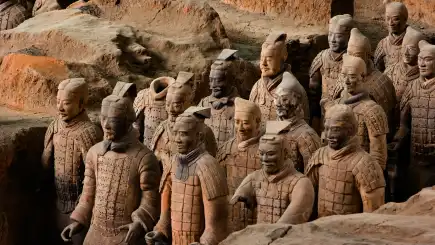Learn archaeology with online courses and programs
What is archaeology?
Archaeologists delve into our human past by examining the remnants we leave behind. Whether it pertains to the earliest foundations of humanity or the more recent historical periods, the artifacts we craft, and the remnants we leave after passing away, provide profound insights into preceding human lifestyles. Archaeology is a vital part of understanding the trajectory of human growth.
Archaeological sites must be carefully preserved and studied, or we risk losing aspects of the human story we may never find again. Once the archaeologist comes across evidence of human presence, such as the Egyptian pyramids, the race begins to catalog and study what the site has to share. Some sites are clear, such as Pompeii with its wealth of human historical records, and some are more mysterious, such as Stonehenge. It’s the job of archaeologists to uncover the secrets and make the connections.

Browse online archaeology courses New
Archaeology course curriculum
Whether you’re considering a career or are driven by a general curiosity about humanity's past, delving into the realm of archaeology can broaden your perspective on history. Material remnants play a pivotal role in shaping our understanding of the human experience.
Archaeological research uncovers our past to help us make decisions about the future. Course topics may include diverse subjects such as the art and archaeology of the Egyptian pyramids, medieval Icelandic sagas, and even the construction of sundials.
If you are interested in studying the field, explore the range of learning opportunities made available through edX. Sign up for an accelerated boot camp or enroll in a full degree program and start working toward a bachelor's degree or (for more advanced learners) a master’s degree in a relevant subject. You can also explore executive education programs specifically designed for busy professionals.
Explore archaeology jobs
The scientific examination of humanity, encompassing studies of neolithic remains to more recent historical periods, casts light on present-day issues, with archaeological inquiries offering indispensable information to help propel us towards the future. Archeology careers can be both on-site and off, such as being a field or an academic archeologist, but you could bring your knowledge to various positions, including:
Cultural resources management: Helps governments preserve important sites and information, including doing inspections before construction projects.
Museum curator or conservator: Maintains museum exhibits and artifacts.
Heritage consultant: Assesses and preserves cultural sites and artifacts, offering expertise in conservation, restoration, compliance, and management.
Forensic archeologist: Analyzes human remains and associated evidence within legal contexts to aid in solving criminal cases or identifying historical individuals.
Tour guide: Provides insightful historical and cultural interpretations during tours of archaeological sites and landmarks.
Last updated
